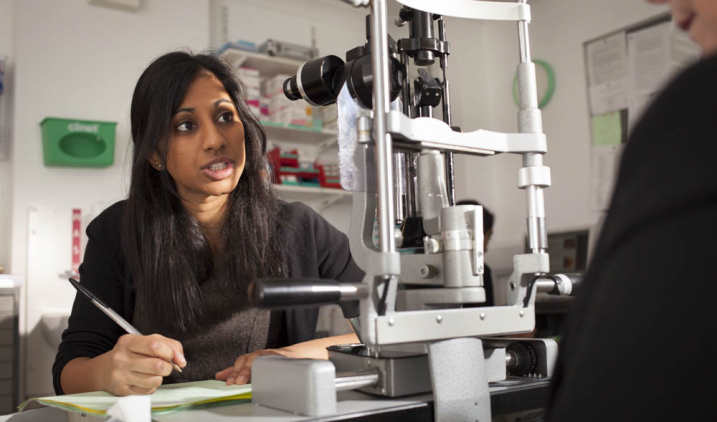Optometrist
Optometrists are at the frontline of eye care. By carrying out detailed examinations, they are helping to improve eye health across the country.
By making a detailed examination of the eye, optometrists may be able to identify whether a patient has conditions such as diabetes or high blood pressure.

Working life
As an optometrist your role is to detect defects in vision, signs of injury, ocular diseases (diseases of the eye) or abnormality, and problems with general health.
As part of your role in a high street practice, you'll:
- make detailed examination of the health of the eyes
- offer clinical advice regarding eye health and vision correction
- prescribe spectacles or contact lenses. You might also dispense, fit and supply spectacles or contact lenses
- make a referral for a specialist’s advice if required – for example is a patient needs surgery or specialist treatment
- you may supervise trainee optometrists, dispensing opticians, and/or medical students during their training.
If you work in a hospital or an eye clinic you’ll be involved in more specialised areas of optometry such as treating and managing patients with:
- glaucoma (an eye disease more common in black people and among the elderly) or
- macular degeneration, which is the most common cause of blindness in western society
Where would I work?
Optometrists work in a variety of settings, including hospitals, high street optometrists, research, teaching, and other health settings. If you work in a hospital or clinic, you’ll be seeing and treating those most in need of urgent attention. You might also work in local health centres and community clinics. You might also undertake some related work in a laboratory or industry setting.
Who will I work with?
Most optometrists work in high street practices which may be independent or part of a regional or national chain, and may be a small or large team depending on practice size.
In a hospital or clinic setting, you'll be part of a large team of eye-specialists, typically including ophthalmologists [1] (medical doctors specialising in the eye), orthoptists [2], and healthcare science staff specialising in ophthalmic and vision science [3]. You will usually work as part of a wider team that also includes specialist nurses [4] and administrative staff [5].
The future of optometry
Optometry may well change over time with some functions becoming more automated, so the role may move further towards interpreting test results and making clinical decisions. Increasingly, there are opportunities to manage certain eye conditions and prescribe for them and there may be more multi-disciplinary working.
Working as a professional in a field such as optometry means that you will never stop learning and continuing professional development is an important part of the role.
Want to learn more?
- Find out more about the entry requirements, skills and interests to enter a career as an optometrist [6]
- Find out more about the training you'll receive to become an optometrist [7]
Other roles that may interest you
- Ophthalmic and vision science [22]
- Orthoptist [23]
- Ophthalmology [24]
- Audiology [25]
